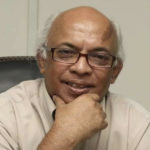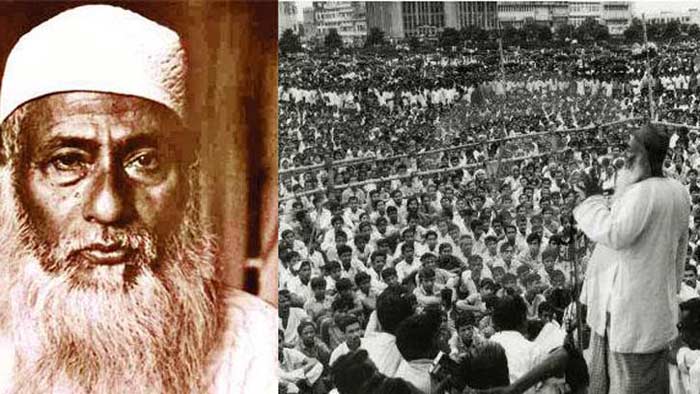Red Moulana remembered
 Syed Badrul Ahsan
Syed Badrul Ahsan
Moulana Abdul Hamid Khan Bhashani, wrote a Pakistani journalist not long ago, was one man who could have saved Pakistan if circumstances had been different. The way Sheikh Mujibur Rahman went ahead with his political programme and the manner in which the army and Zulfikar Ali Bhutto made a mess of things, argued this journalist, it should have been for Bhashani to stem the decline of the old Muslim state.
The Pakistani journalist’s understanding of Bhashani’s politics was flawed. It is much the same with many others here in Bangladesh. The Moulana was a complex man. He shed copious tears before Mohammad Ali Jinnah as he narrated the plight of the Muslims of Assam in pre-partition India.
And yet by the late 1950s he had come round to the conclusion that Pakistan needed to be accorded a farewell in East Bengal. His ‘assalam-o-alaikum’ remains one of the myriad ways in which he continues to be defined. And do not forget that Bhashani, only four days before the general election of December 1970, declared the ‘independence’ of East Pakistan.
On the anniversary of his death, it is certainly time to analyse the place Bhashani, once castigated as the Red Moulana because of his leftist leanings, holds in Bangladesh’s history. That he was a pivotal figure in the gradual build-up of the movement against Pakistan in the 1960s is beyond question. And yet one cannot forget that in the mid-1960s, he did not want Ayub Khan to be disturbed because Pakistan’s military ruler was then busy forging links with China.
Moulana Bhashani admired Mao Zedong’s China and yet, in less than a decade, as Bengalis waged war against an oppressive Pakistani military junta, he was disappointed and embarrassed that the Chinese leadership had taken Yahya Khan’s side in the conflict, that it had not heeded his call that Beijing support the War of LiberationBangladesh’s people were engaged in in 1971.
It is to Moulana Bhashani’s credit that peasants and workers in East Pakistan were roused to an awareness of their worth in life. And nothing that the fanatical Muslim rightwing did to damage his reputation among his followers worked. He was looked upon as a revered soul, one who was regularly asked to bless the unfortunate and the poorby praying and blowing into the water they brought to him in jars and bottles.
Politically, he was a brave man and not even Iskandar Mirza’s threat to shoot him ‘like a dog’ (Mirza’s rude words) had any effect on him. As part of the United Front with Suhrawardy and Fazlul Huq in 1954, he crisscrossed the country informing Bengalis of all the evils the Muslim League administration had been perpetrating. It was one of his finest hours.
And then came another such hour in 1969, when he publicly demanded that the Ayub regime free Sheikh Mujibur Rahman and withdraw the Agartala conspiracy case. He believed there was nothing morally wrong about asking people to burn and besiege — jalao gherao — the edifice of a regime that lacked legitimacy. And do not forget that it was his threat to lead a million Bengalis to the Kurmitola cantonment to free Mujib that unnerved the government.
That act made the nation fall in love with him all over again. And yet the nation was perplexed when he, in alliance with Bhutto, decided to stay away from the Rawalpindi round table conference to which Mujib, by then Bangabandhu, was going. Of course, it was his belief that the RTC would yield little or nothing in that positive sense of the term.
The Bhashani character was a continual, queer mix of the defiant and the unpredictable. He evidently was unhappy at the minimal role he was made to play at Mujibnagar in 1971. But that was no reason for him to abandon the struggle. It was in anger that he turned his lieutenant Mashiur Rahman Jadu Mia away when the latter linked up with him and tried persuading him to return to occupied Bangladesh.
Bhasahni’s belief in the secular struggle for Bangladesh was unequivocal; and yet when in free Bangladesh he launched what he called his Muslim Bangla programme, it was the Bengali state that was undermined. He did not see the damage he was causing. His media outlet Haq Katha went into overdrive to undermine Bangabandhu’s government. At public rallies he employed language that was caustic in its criticism of the ruling Awami League.
And yet the Moulana’s affection for Bangabandhu was public knowledge, even if Bhashani had once thought Mujib would, like him, voice his opposition to Pakistan’s involvement in CENTO and SEATO in the mid-1950s. The alliances were anathema to him, the consequence being his decision to quit the Awami League in protest against the foreign policy pursued by Prime Minister Huseyn Shaheed Suhrawardy.
At Kagmari, in 1957, he formed the National Awami Party (NAP). The imposition of the Baksal system on the Bangladesh state in early 1975 caused him justified anguish. He made it clear that a reversal of democracy was an act he did not welcome. Barely a couple of months later, though, when Bangabandhu travelled to Santosh to see him, Bhashani left no one in any doubt that he supported Bangabandhu’s Second Revolution.
That position changed again when a coup d’etat claimed the life of the Father of the Nation in August 1975. Bhashani expressed no sorrow or regret, in public, at the tragedy. He did not condemn the coup and the assassination of Bangladesh’s founder.
Nor did he have anything to say when the four national leaders — Syed Nazrul Islam, Tajuddin Ahmad, M. Mansoor Ali, A.H.M. Quamruzzaman — were gunned down in prison nearly three months later. But when Khondokar Moshtaque visited him soon after the 15 August coup, Bhashani reportedly reprimanded him for what he called teaching the tiger to taste blood.
Warts and all, Moulana Bhashani was a significant factor in the politics of pre-1971 Pakistan and later independent Bangladesh. He commanded respect across the spectrum despite the shifting sands of his politics. Never seeking office, he was content to arrogate to himself the role of a people’s guardian, constantly berating those in political authority about their failings, endlessly reminding people that he was the spokesperson of the oppressed.
In his tutelage arose some politicians of conviction and left-wing persuasion. But those politicians eventually betrayed his ideals through compromise with military dictatorship, through sharing political platforms with the capitalist class and with the forces of communalism.
And there lies the tragedy. All these decades after his passing, there is no one to carry Bhasahni’s torch forward. Those who could have held the torch aloft simply walked away, into a domain where elitism corrodes politics and idealism loses meaning.
(Moulana Abdul Hamid Khan Bhashani, founder president of the Awami Muslim League, founder of the National Awami Party, pre-eminent political leader, was born on 12 December 1880 and died on 17 November 1976).
(Syed Badrul Ahsan: contributing columnist, Shottobani)

